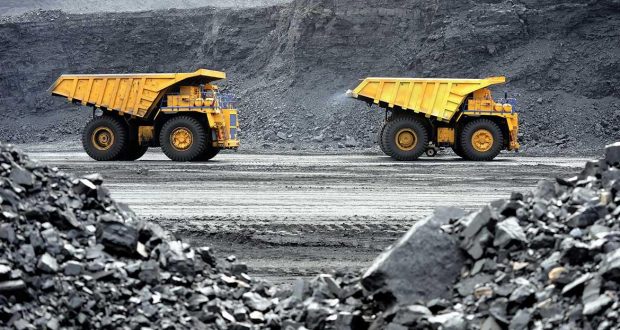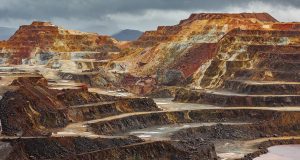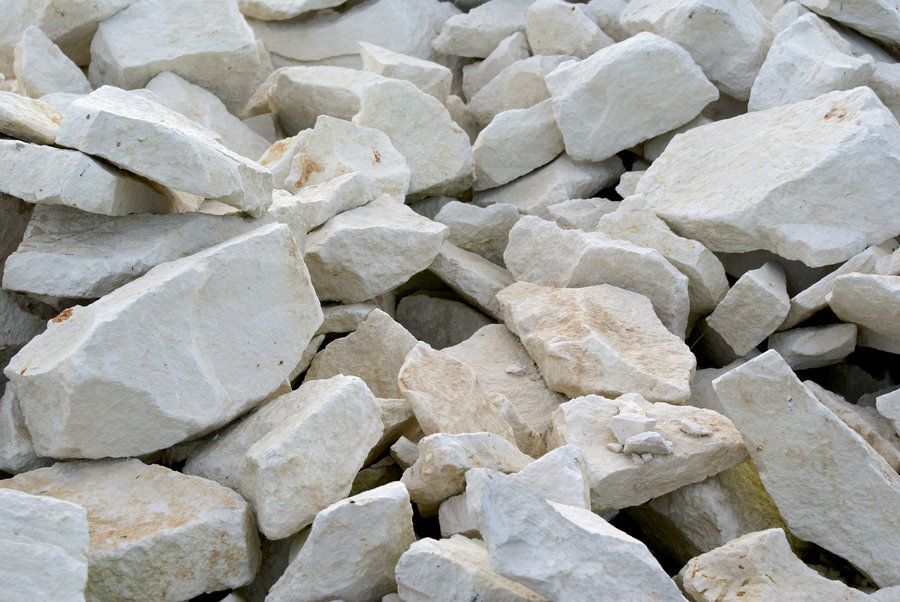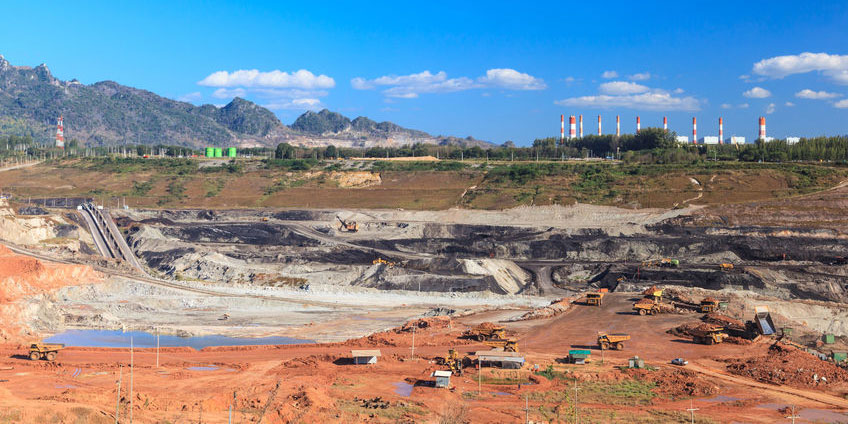Minerals along with the availability of sufficient water, land and man power resources, Odisha should have been the leading state in India for production of large amounts of energy as well as various types of metals and alloys. It is expected that, the integrated iron and steel, special steels, sponge iron, ferro alloys, aluminium and aluminium alloys and strategic metal industries should have come up in a big way. But, the situation at present in the state is far from the expectations.
Mineral resources of the world have been the key raw materials for most of the major industries. The industries like production of iron and steel and other nonferrous metals and alloys, refractories, cement, inorganic chemicals and fertilizers, thermal and nuclear power plants are mineral based. Coal and other fossils fuels are used in generating thermal energy and the nuclear metals like uranium is used to produce nuclear power. Metallic minerals like bauxite, chromite, iron and manganese ores, ileminite etc. are used to produce the respective metals and their alloys. All these industries require adequate raw materials mainly minerals, water and energy. In recent decades, due to rapid increase in population particularly in developing countries like India and establishment of various types of industries, the demand for metals and their alloys and, energy is increasing at a very fast rate. In view of this, in recent years, in India even in its mineral rich State like Odisha, a lot of scarcity of the raw materials for our mineral based industries and power plants, is being experienced. The metallurgical industries are hungry for proper grade of ores and minerals as well as for cheap energy and water resources. Similarly, the thermal power plants are facing a lot of problems in obtaining sufficient amounts of good grade coal.
During the last four to five decades of industrial development, most of Odisha’s high grade mineral resources have been mined extensively for some internal consumption and export purposes. In this way the high grade minerals have been nearly exhausted. As mineral resources are non-replensible in nature, it has been necessary to conserve these valuable resources and develop various technologies to process the low grade and complex minerals for sustaining the mineral based industries in the state as well as in the country.
Scope of Mineral Based Industries:
The scope for developing the major mineral based industries in Odisha is immense. The state is considered to be the major source of most of the important minerals of India. The important minerals like coal, iron ore, bauxite, chromite, manganese ore etc. are available in large quantities in the state along with other important resources like land, water and man power. Odisha has got 27% coal, 26% iron ores, 65% bauxite, 31.7% manganese ore, 98.3% chromite, 95.1% nickel ore, 20.7% of ilmenite and 76.67% graphite out of the total deposits of the respective minerals in India. The amounts of various major mineral reserves of Odisha and India are given in the following table:
Principal Mineral Reserves (Million Tons)
|
India |
Odisha |
Percentage (between India and Odisha) |
|
| Coal |
214 B.T.* |
58 B.T.* |
27% |
| Lignite |
29 B.T.* |
— | — |
|
Iron-Ore |
13650 | 3567 |
26% |
| Manganese Ore |
167.0 |
53 |
31.7% |
| Chromite | 186 | 183.0 |
98.3% |
| Bauxite |
2631 |
1714 |
65% |
| Limestone |
76708 |
1030 |
1.34% |
| Dolomite |
4086 |
434 |
10.6% |
| Copper Ore |
512 |
— | — |
| Zinc and Lead Ore |
499 |
2.4 |
0.48% |
| Graphite |
4.6 |
2.0 |
43.4% |
|
Fire Clay |
696 | 108 |
15.5% |
| China Clay |
1068 |
157 |
14.7% |
| Ilmenite |
146 |
20.7 |
14.1% |
* Billion tons
However, with all these minerals along with the availability of sufficient water, land and man power resources, Odisha should have been the leading state in India for production of large amounts of energy as well as various types of metals and alloys. Keeping in view the requirements in the country of various metals and alloys and the resources available in the state of Odisha, it is expected that, the integrated iron and steel, special steels, sponge iron, ferro alloys, aluminium and aluminium alloys and strategic metals like nickel, vanadium, titanium, zirconium etc. industries should have come up in a big way. But, the situation at present in the state is far from the expectations.
Reasons for Mineral based Industries in Odisha moving slow:
Odisha though rich in various types of mineral resources, yet the mining of minerals and the mineral based industries are not very many and most of these are not functioning satisfactorily. Most of the existing mineral based industries covering the areas of mining, mineral processing, harnessing energy, metal extraction and fabrication etc., in Odisha do not adopt environment friendly technology and as a result these industrial areas face a lot of pollution problems. Further, because of poor implementation of socio economic welfare programmes particularly for the displaced families in the region, a lot of resentments are voiced by various sections of the people and as a result, the industries suffer considerably. Sometimes, due to want of proper planning and coordination between various concerned government departments, many industries suffer from want of raw materials like minerals, water and power.
Some of the typical problems for developing the mineral based industries in Odisha are mentioned below:
- The unscientific mining by most of the mine owners in Odisha has resulted in loss of large amounts of good grade ores in the form of fines. The craze for earning quick money and the faulty mineral policy of the country, are driving some of the mine owners to adopt various unfair means to export large amounts of good grade minerals and leaving behind the low grade ones in the mines to be diluted and ultimately lost with the overburden.
- In many mineral based industries, the out dated technology is being utilized to process the low grade minerals to produce the suitable grade raw materials for metallurgical and thermal power plants resulting in loss of large amounts of mineral values as wastes. Further, during grinding of the minerals for beneficiation and producing the metals and alloys, a lot of energy is being consumed because of inefficient technology and operational procedures. In many mineral based industries particularly during washing and beneficiation of the ores and minerals, huge quantities of water are used and the effluents are released to land and water bodies with least care for removing the toxic materials and then recycling the used water. The mismanagement and improper disposal of the wastes cause a lot of environmental problems.
- Due to want of proper grade minerals, the existing industries are suffering a lot. For example, some years back, the Ferro Chrome Plant of Industrial Development Corporation (IDC) at Jajpur – Keonjhar road, Odisha, was facing acute shortage of lumpy chromite ores for production of ferro chrome in their plant. As a result, the plant was producing ferro chrome much below its capacity. At that time, the author was the Director of Regional Research Laboratory, CSIR at Bhubaneswar (presently known as Institute of Minerals and Material Technology), one of the members of the Board of Directors of IDC and also a member of the State Planning Board, Government of Odisha. At the request of the industry, the author and his colleagues in the Laboratory developed a techno economically viable process to agglomerate the abundantly available chromite ore fines to make the material suitable as the raw material for making ferro-chrome. As a result, since then the plant has been procuring the cheaper chromite ore fines available in the mines to agglomerate and use in the plant to produce ferro- chrome.
- As mentioned earlier, Odisha has got the privilege of having large amounts of high grade iron ores as well as non-coking coal and also good grade lime stone. These are the major raw materials for sponge iron industries. In view of this, during the last two decades, a large number of sponge iron industries mostly in private sector, have come up in the state using the rotary kiln process. But at present, quite a number of these plants are facing acute shortage of both good grade lumpy iron ores and non-coking coal. As a result, most of these plants are running with much below their capacities and some of these have been closed down. However, if the sponge iron industries would have planned to produce pellets by utilizing the abundantly available cheap iron ore and coal fines, then this type of problem would not have come in their way and they would have been able to produce sponge iron smoothly with full capacity of their plants. This would have also helped to produce more steel and thus providing employment opportunities to a large number of people
- The state has got nearly 65% of India’s total reserve of bauxite, but it is unfortunate that, when the country’s requirement of aluminium is rapidly increasing, some of the existing plants in the state with most modern technology are forced to shut down their plants or run their plants with low capacity because of want of bauxite. Though there are large reserves of high grade bauxite in different parts of the state, it is reported that, some local NGOs are strongly objecting to open up these mines with a plea that the mining would harm the environment and the socio economic condition of the people living in the region. This type of attitude for obstructing the use of this vital natural resource for producing aluminium and thus not facilitating the socio economic development of the people in the region should be discouraged both by central and state governments. The local people should not be misled by citing some vague reasons for not mining the bauxite. However, the concerned industries should implement environment friendly mining with rain water harvesting and under taking massive plantation of economic species in the mined area and at the same time taking the local people in to confidence through implementation of socio economic uplift programmes particularly for the displaced families in those areas. This would bring from the very beginning a better working atmosphere for the mining and the metal industry.
- In Odisha, long range planning for producing high valued nickel, cobalt and also refractory metals like titanium, zirconium, vanadium etc., and their alloys is missing. The state has got a few ferro-alloy industries mainly in the areas of ferro-chrome, ferro- manganese and ferro-silicon. The other high valued ferro-alloys like ferro-nickel, ferro-titanium, ferro-vanadium etc. are very much required for developing various types of alloy steels in the country. As mentioned earlier, some of the raw materials needed for producing these ferro alloys are substantially available in Odisha.
- Large numbers of mineral based industries in Odisha are suffering from not only because of want of the proper grade mineral resources but also for other essential items like energy and water. For example, sharing river water with the villagers and the farmers brings a lot of problems for the industry. As a result, many time these industries run much below their production capacity due to want of water.
- In many cases due to the absence of proper coordination amongst concerned departments of the State Government, the entrepreneurs run from post to pillar for materializing the project. The delay due to this, escalates very much the project cost and discourage them.
- The existing industries many times fail to implement their commitments in their environment management plan. Because of this, the environment in the region gets highly polluted for which a lot of resistance comes from the public. In addition to this, most of the time the industries do not implement properly the committed programmes under Corporate Social Responsibility (CSR) for which the displaced families from the industrial area bring a lot of obstructions in the smooth functioning of the industrial units.
Steps for facilitating the growth of Mineral Based Industries:
In order to conserve and judiciously utilize the mineral resources available in the state for developing mineral based industries, the following measures should be taken in to consideration.
- Extensive and systematic survey and location of new reserves of various types of minerals like coal, iron and manganese ores, chromite, bauxite as well as other non ferrous metallic minerals have to be carried out.
- The mining practices should be modernized. Both high and low grades ores have to be mined and utilized suitably. For example, in India, iron ores containing less than about 50% of iron, are rejected as wastes where as in some other countries it is considered as a valuable raw material for iron making after beneficiation. Therefore, mineral resources below the cut off grade should be upgraded for use or preserved as such for the future.
- In order to increase the production of the minerals, mining to greater depths as it is being practiced in some other countries like Australia, should be adopted in order to increase the amounts of minerals for use.
- Efforts should be made to develop techno economically viable mining practices for harnessing the minerals from smaller deposits. Mining of even small deposits particularly of non ferrous metals should be under taken and utilized for extracting the respective metals.
- Every effort should be made to upgrade the low grade minerals or blend those with the high grade ones for their maximum utilization in different industries.
- In all cases, the washery slimes and beneficiation tailings of the upgraded minerals should be further processed for recovering the remaining mineral values.
- Beneficiation and agglomeration units for low grade minerals should be set up as far as possible, at the mine site of the concerned mineral with arrangements for harvesting rain water, recycling the used water and disposing the wastes along with overburden for back filling the mines. In this process, the water scarcity, waste of minerals during transportation and pollution problem due to wastes and effluents can be solved.
- The wastes of other mineral processing and metallurgical industries should be also examined to process and recover the values and then the remaining wastes should be utilized as construction materials or back filling the low lying areas. This would not only help in minimizing the pollution problems but also conserve the resources.
- The amount of non-coking coal is much more than the coking ones. It is advisable to produce more and more iron in the form of sponge iron by using non-coking coal as such and if necessary after washing or through their gasification.
- In order to produce high valued special alloy steels, necessary steps to be taken to utilize the indigenous non ferrous metals resources or through import of some metals like nickel, vanadium, niobium etc. so that these can be utilized to produce special steels for consumption in the country and if necessary can be exported.
- Environment Friendly Best Available Technology (EFBAT) has to be adopted for producing various metals and alloys so that the products can be produced at a competitive price in the international market with zero waste.
- The practice of “exporting the minerals” should be changed to the policy of “exporting the value added products” like special steels, aluminium and its alloys, machineries and equipments. It may be pertinent to mention here that, though our chromite reserves is only 2 – 3% of world’s reserve, yet we export a large amount of this instead of producing high valued chromium, ferrochrome or chromium chemicals.
- In order to commission a project in time, proper plan and their execution should be made by providing the entrepreneur the necessary approval in a package form including the infrastructural facilities like land, water, electricity, transport facilities, supply of quality raw materials and assistance for having trained personnel.
- Both in the mines and mineral based industrial areas, sufficient care should be taken to implement the Corporate Social Responsibility programmes (CSR) very sincerely particularly for the displaced families. This would go a long way in commissioning and running the industries smoothly.
Conclusion
The state of Odisha, in view of its high reserves of different types of important mineral resources is occupying an unique position in India for developing various mineral based industries. However, it is necessary to mine and utilize the mineral resources scientifically using environment friendly best available technology. The other resources like land, water, power, transport facilities etc., required for developing the mineral based industries are also very much available in the state. In order to facilitate the development of mineral based industries in Odisha, a coordination between different concerned government departments and getting trained personnel are very essential. The major industries including integrated iron and steel, sponge iron, ferro alloy, alloy steels, aluminium and some other nonferrous metals and their alloys, cement, refractors and chemicals have got lots of scope to be developed in the state in much more numbers during the years to come. These industries while giving large scale employment opportunities to the people of Odisha, will also help to meet the growing needs of the country. Before it is too late, the Government of Odisha should take necessary steps in developing and conserving the mineral resources and assisting in setting up the mineral based industries in large numbers. The other raw materials like land, power and water should be developed and made available as per the requirements of the industries. The road, rail and sea transportation systems for transporting raw materials and finished goods should be developed adequately. The industries in their own interest should be very sincere to materialise the Corporate Social Responsibilities (CSR) programmes and maintaining the environment of the region. In this way the poor Odisha can be transformed in to a rich state. ODISHA INDUSTRY2016-17
 Indian Industry Plus A Pratisrutiplus Suppliment
Indian Industry Plus A Pratisrutiplus Suppliment















